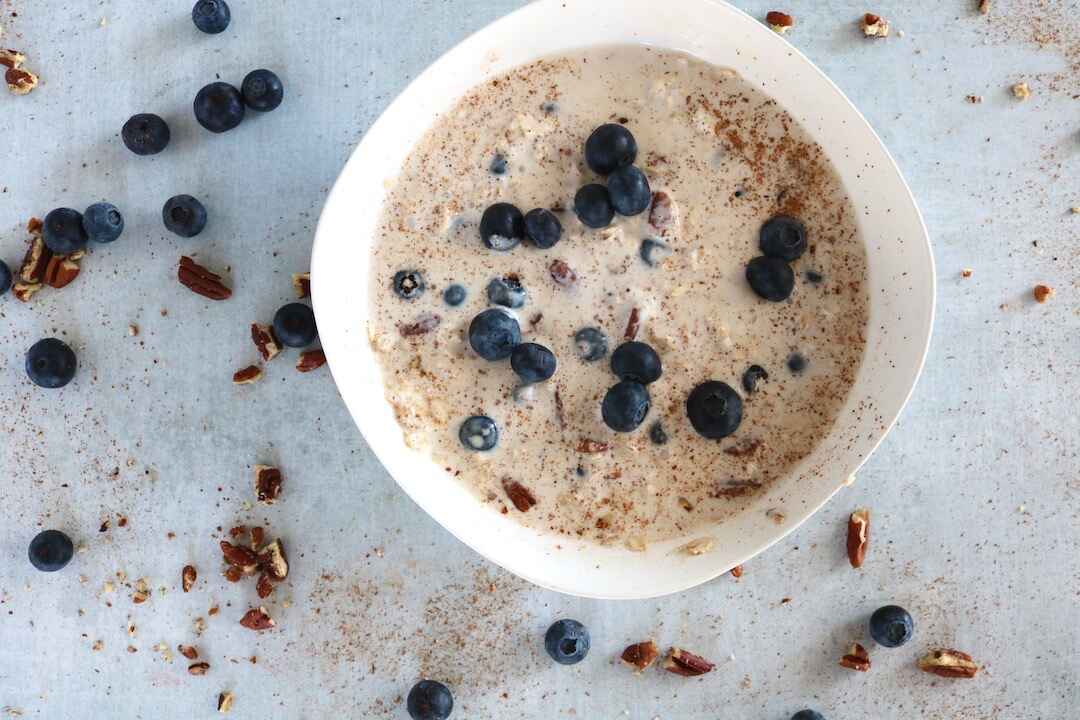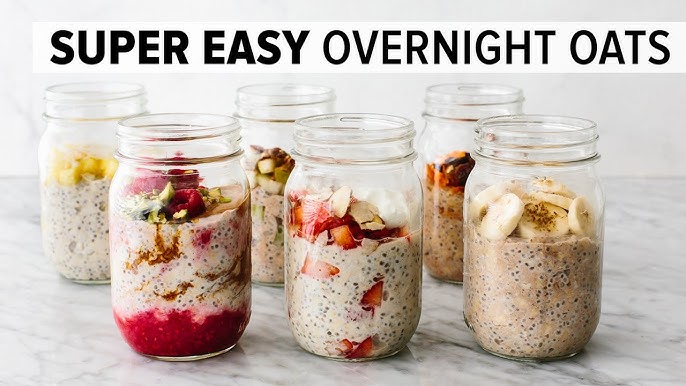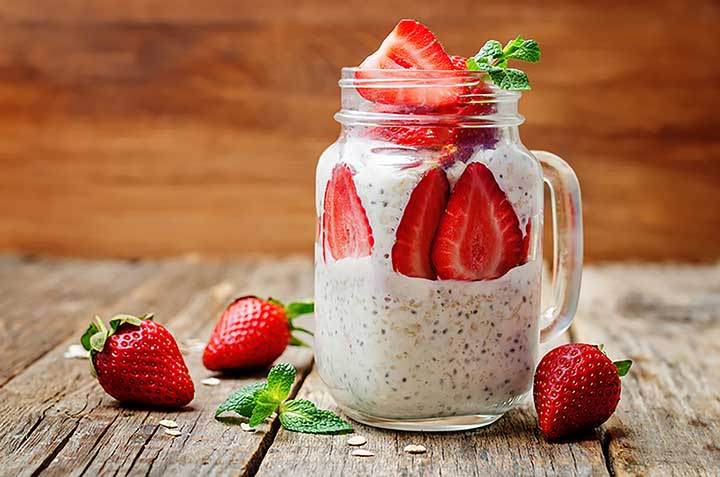Are Overnight Oats Healthy? Benefits, Nutrition & Recipes
@vikusingh1788 | Posted on March 31, 2024
Are Overnight Oats Healthy?
Overnight oats are now widely embraced for their convenience and nutritional value, becoming a favored choice for breakfast. This simple yet versatile meal offers a plethora of health benefits, making it a favorite among health-conscious individuals. Let's delve into the reasons why overnight oats are considered a healthy choice for starting your day.
Nutrient-Rich Breakfast Choice
One of the key advantages of overnight oats is their nutrient density. They are rich in fiber, protein, vitamins, and minerals like manganese, phosphorus, magnesium, copper, iron, and zinc.
Energy Booster
Overnight oats provide a balanced combination of protein and fiber-rich carbohydrates, offering sustained energy throughout the morning. This nutrient profile makes them an excellent choice for those looking to kickstart their day with a nutritious meal.
Weight Management
For individuals aiming to manage their weight, overnight oats can be a valuable addition to their diet. They are low in calories, high in fiber, and contain resistant starch that helps in promoting satiety and supporting weight loss efforts.
Digestive Health
The fiber content in overnight oats supports digestive health by regulating bowel movements, preventing constipation, and promoting a healthy gut microbiome. Additionally, the beta-glucan in oats aids in improving digestion and overall gut health.
Blood Sugar Regulation
Overnight oats can help in regulating blood sugar levels due to their low glycemic index and high fiber content. This makes them a suitable choice for individuals looking to manage their blood sugar levels effectively.
Heart Health Benefits
The beta-glucan present in oats contributes to reducing cholesterol levels, thus supporting heart health. Additionally, the vitamin C content in oats helps prevent oxidation of LDL cholesterol, which is crucial for maintaining a healthy heart.
In conclusion, overnight oats are not only a convenient breakfast option but also a nutritious choice packed with essential nutrients that support various aspects of health. By customizing your overnight oats with antioxidant-rich fruits, protein-packed nuts, and seeds, or natural spreads, you can create a delicious and wholesome meal to kickstart your day on a healthy note.
So, next time you prepare your overnight oats, remember that you are not just enjoying a tasty breakfast but also fueling your body with a range of nutrients that contribute to your overall well-being. Make the most of this simple yet powerful breakfast option and savor the benefits it brings to your health and lifestyle.
By incorporating overnight oats into your morning routine, you are not just having a meal but making a conscious choice towards a healthier and more balanced lifestyle. Enjoy the goodness of overnight oats and kickstart your day with a nutritious and delicious breakfast option!

Overnight oats have surged in popularity as a go-to breakfast option, especially for those looking for a quick and convenient meal to start their day. But beyond convenience, are they truly as healthy as they seem? In this blog post, we’ll explore the nutritional profile, health benefits, and potential downsides of overnight oats, along with some creative ways to make them even healthier.

What Are Overnight Oats?
Overnight oats are essentially oats soaked in liquid—whether water, milk, or a dairy-free alternative—overnight, allowing them to absorb the liquid and soften. Unlike traditional oatmeal, which is cooked, overnight oats are "prepared" through soaking, resulting in a creamy and ready-to-eat meal in the morning. The no-cook nature of overnight oats not only saves time but also makes them a popular choice for meal prepping.
Nutritional Profile of Oats
Oats are nutrient-dense whole grains, packed with essential vitamins, minerals, and fiber that contribute to various aspects of health. Here’s a breakdown of why oats are considered a superfood:
1. High in Fiber
One of the key health benefits of oats is their high fiber content, particularly a type of soluble fiber called beta-glucan. Beta-glucan has been shown to help reduce cholesterol levels and promote heart health. Additionally, fiber aids digestion and helps regulate blood sugar levels, making oats an excellent option for people looking to manage their weight or blood sugar.
2. Rich in Vitamins and Minerals
Oats are a great source of essential vitamins and minerals, including manganese, phosphorus, magnesium, and vitamin B1 (thiamine). These nutrients play crucial roles in energy metabolism, bone health, and nervous system function. For instance, magnesium in oats can help regulate blood pressure and support muscle and nerve function.
3. Protein Content in Oats
While oats aren’t the highest-protein grain, they still offer a moderate amount of plant-based protein—about 5 grams per serving. Pairing oats with other protein sources like nuts, seeds, or Greek yogurt can further boost the protein content of your meal, making it more balanced and satiating.
Health Benefits of Overnight Oats
Eating overnight oats regularly can provide a wide range of health benefits, from supporting heart health to improving digestion.
1. Supports Heart Health
The beta-glucan fiber in oats is particularly beneficial for heart health. Studies have shown that beta-glucan can reduce LDL (bad) cholesterol levels without affecting HDL (good) cholesterol. This makes oats an excellent food for anyone looking to lower their risk of heart disease.
2. Aids in Weight Management
Overnight oats are filling and can help regulate hunger, making them an excellent choice for those aiming to maintain or lose weight. The fiber in oats slows down digestion, keeping you fuller for longer and reducing the likelihood of overeating later in the day.
3. Boosts Digestive Health
The fiber content in oats promotes healthy digestion by aiding in regular bowel movements and preventing constipation. The prebiotic fiber in oats also feeds the good bacteria in your gut, which supports overall gut health.
4. Sustained Energy Release
Oats provide a slow-releasing source of carbohydrates, which helps maintain steady energy levels throughout the day. Unlike quick sugars, which lead to energy spikes and crashes, oats offer sustained energy, making them an ideal breakfast for busy mornings.
Potential Downsides of Overnight Oats
While overnight oats are a nutritious and convenient option, there are a few considerations to keep in mind.
1. Calorie-Dense Add-Ins
Many people add toppings like nuts, seeds, sweeteners, or dried fruit to their overnight oats. While these ingredients can add flavor and nutrition, they can also significantly increase the calorie count. To keep your overnight oats balanced, it’s important to be mindful of portion sizes and choose nutrient-dense toppings in moderation.
2. Phytic Acid and Mineral Absorption
Oats, like many grains, contain phytic acid, an antinutrient that can inhibit the absorption of minerals like calcium, iron, and zinc. While soaking oats overnight reduces some phytic acid, it may not completely eliminate it. However, for most people, this is not a major concern unless oats are consumed in large amounts daily.
3. May Not Be Suitable for Everyone
People with specific dietary restrictions, such as those with celiac disease or severe gluten intolerance, should opt for certified gluten-free oats. While oats are naturally gluten-free, they are often processed in facilities that handle gluten-containing grains, leading to potential cross-contamination.
How to Make Overnight Oats Healthier
There are several ways to enhance the health benefits of overnight oats, making them an even better option for your diet.
1. Use Nutritious Toppings
Incorporating toppings like fresh fruits, chia seeds, flaxseeds, and unsweetened nut butters can boost the nutrient density of your overnight oats. These additions provide extra fiber, healthy fats, and antioxidants, turning your breakfast into a nutrient-packed meal.
2. Choose Healthy Sweeteners
If you like your oats sweet, opt for natural sweeteners like honey, maple syrup, or mashed banana to keep your overnight oats low in processed sugars. Avoid using refined sugars, as they can cause blood sugar spikes and negate some of the health benefits of oats.
3. Add Protein-Rich Ingredients
Enhancing the protein content of your oats by adding Greek yogurt, protein powder, or nuts can make them more filling and beneficial for muscle repair. This is especially important for people who need higher protein intake, such as athletes or those looking to build muscle.
4. Experiment with Liquid Choices
Using plant-based kinds of milk like almond, oat, or soy milk can alter the nutritional profile and offer variety for those avoiding dairy. Plant-based milks often contain added vitamins and minerals, such as calcium and vitamin D, which can complement the nutrients in oats.
Overnight Oats for Different Dietary Needs
Overnight oats can be easily adapted to meet a wide variety of dietary needs and preferences.
1. Vegan-Friendly Options
For vegans, simply substitute dairy milk with plant-based alternatives like almond milk, soy milk, or coconut milk. Use maple syrup or agave nectar as sweeteners and top with fruits, seeds, and nuts for a completely plant-based meal.
2. Gluten-Free Variations
To make overnight oats gluten-free, ensure you’re using certified gluten-free oats and avoid any potential gluten-containing toppings like some granolas or cereal bars. Gluten-free oats are widely available and make this breakfast option accessible to those with celiac disease or gluten sensitivities.
3. Low-Sugar and Diabetic-Friendly Choices
Diabetics and those watching their sugar intake can focus on using low-glycemic sweeteners like stevia or monk fruit. Fiber-rich fruits like berries can also add sweetness without spiking blood sugar levels. Additionally, incorporating protein and healthy fats from nuts or seeds can help stabilize blood sugar.

Creative Overnight Oat Recipes to Try
Here are a few delicious overnight oat recipes to add variety to your breakfast routine, each packed with different flavors and nutritional benefits.
1. Classic Peanut Butter and Banana Overnight Oats
A timeless combination, of peanut butter, and banana overnight oats provides a hearty, protein-rich start to the day. Simply mix oats, almond milk, a spoonful of peanut butter, and slices of banana, and you’re good to go.
2. Berry-Almond Overnight Oats
Loaded with antioxidants and healthy fats, this recipe features a mix of fresh berries and sliced almonds. The berries offer a burst of flavor, while the almonds add a satisfying crunch.
3. Chocolate-Coconut Overnight Oats
For a decadent yet healthy twist, try this chocolate-coconut combination. Use unsweetened cocoa powder, coconut milk, and a sprinkle of shredded coconut for a dessert-like breakfast that still keeps things nutritious.
4. Apple Pie Overnight Oats
A fall favorite, this recipe features warm spices like cinnamon and nutmeg with chunks of fresh apple for a cozy breakfast treat. The addition of chia seeds adds extra fiber and omega-3s.
How to Store Overnight Oats and Maximize Freshness
To get the most out of your overnight oats, it’s important to store them properly and know how long they will stay fresh.
1. Best Containers for Storing Overnight Oats
Using airtight glass jars or containers helps keep overnight oats fresh and prevents them from absorbing unwanted flavors from other foods in the fridge. Mason jars are a popular choice for overnight oats since they are portable and easy to seal.
2. How Long Do Overnight Oats Last?
Overnight oats can last in the fridge for up to five days, making them an excellent option for meal prep. You can prepare multiple jars at the beginning of the week and grab one each morning for a no-fuss breakfast.
3. Freezing Overnight Oats
If you want to prepare your oats further in advance, they can be frozen and thawed overnight in the fridge for a quick, ready-to-eat breakfast. Just be sure to leave some room in your container, as liquids expand when frozen.
Are Overnight Oats Healthier Than Cooked Oats?
One common question is whether overnight oats are healthier or offer more benefits compared to traditional cooked oats. While both options have their advantages, here are some key differences:
1. Nutrient Retention in Overnight Oats
Some research suggests that soaking oats overnight may help retain more of their nutrients, especially heat-sensitive ones like B vitamins. Cooking oats at high temperatures can cause some nutrient loss, whereas soaking preserves most of their natural goodness.
2. Digestibility of Overnight vs. Cooked Oats
Overnight oats may be easier to digest for some people since the soaking process helps break down starches and reduces phytic acid. This can make the oats gentler on the stomach, especially for those with sensitive digestion.
Conclusion: Are Overnight Oats Healthy?
In conclusion, overnight oats are a highly nutritious, versatile, and convenient breakfast option that can be tailored to meet a variety of dietary needs. Their high fiber content, essential vitamins and minerals, and potential to support heart health, digestion, and sustained energy make them a valuable addition to a balanced diet. However, it’s important to be mindful of calorie-dense toppings and any dietary restrictions, such as gluten intolerance or diabetes. By customizing your oats with nutrient-dense ingredients and healthy add-ins, you can enjoy a breakfast that’s not only quick but also incredibly beneficial for your overall health.
Whether you’re following a vegan, gluten-free, or low-sugar diet, overnight oats can be easily adapted to suit your nutritional needs. With countless recipe variations, you’ll never get bored of this wholesome breakfast staple.